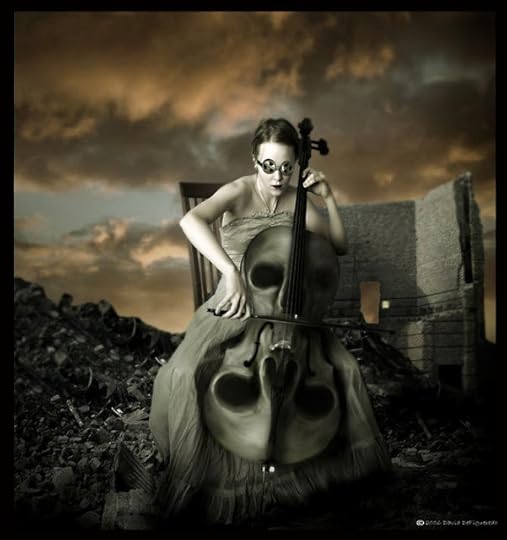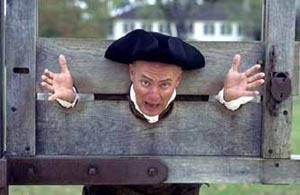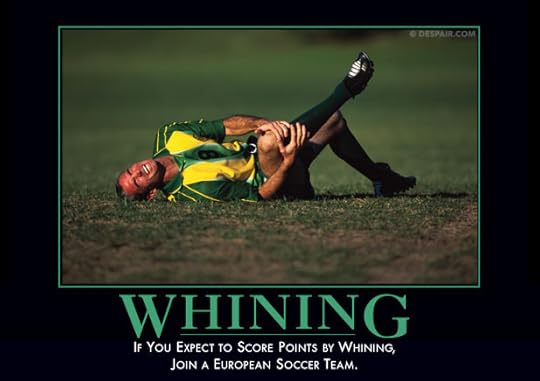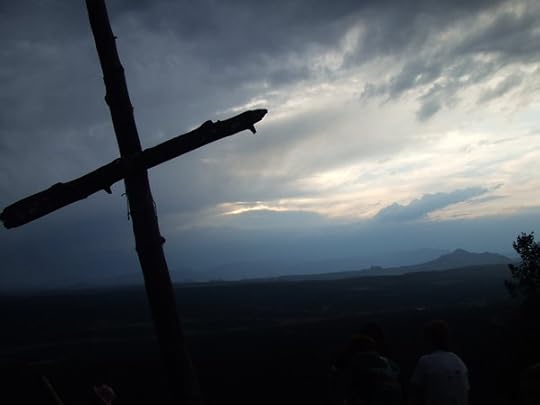Patrick Todoroff's Blog, page 39
October 24, 2012
Traditional Publishing and the Coriolanus Effect

Worth watching for Ralph Fiennes’ performance alone.
“By Jove himself, it makes the consuls base, and my soul aches to know when two authorities are up, neither supreme, how soon confusion may enter twixt the gap of both and take the one by the other. Thus we debase the nature of our seats and make the rabble call our cares fears, which will, in time, break open the locks of the senate, and bring in the crows to peck the eagles!” Caius Martius Coriolanus. Coriolanus, Wm. Shakespeare
Methinks they doth protest too much – these traditionally-published authors.
I’m not picking on Mike D. but it seems to me the implicit logic in posts like the one here or here is that Self-Pub works are inherently inferior. That self-pubbed writers lack patience, or maturity, or the skill to adhere to the ‘normal’ publishing model. It’s the notion that if you were really good, you’d be picked up by an agent and a big house.
No question there’s a deluge of tepid, banal, pathological rubbish in the self-pubbed offerings. Anyone whoever played D& D or fantasized about a sexual encounter can jump on the internet and add their adventures to the pile. But Mediocrity is no respecter of persons; I’d venture an equal proportion sits on bookstore shelves. Indeed, one of the burrs in my saddle is the unfortunate purchase of what turns out to be an awful book. It’s happened to you, I’m sure. And no doubt you thought, “Someone got money for this? I could do better with a crayon, a pad of paper and a fifth of Smirnoff.” Flannery O’Connor was right when she said many a bestseller could have been prevented by a decent writing teacher. We all know an official seal of approval isn’t a guarantee of quality.
Here’s the real question: Is there really a cosmic battle between Self and Traditional Publishing? Is the enmity valid? Will acknowledging Indie writers (artists of any stripe) really bring in the crows to peck at the eagles?
Antagonism is there alright, on both sides. I just don’t believe the arguments hold up under scrutiny.
The Traditional model has established avenues of marketing, distribution, a level of quality control. So long as the world and technology played along, they were the Gate-Keepers. They passed olive branches to the worthy. Nowadays however, the fences are down completely and the issue isn’t that Self-Pubbed is innately sub-standard, but that those same avenues, those checks, haven’t had time to solidify. What you see now are the growing pains of a new paradigm. (I feel so cheap now, sounding all business-chic, like that.)
I think technology and connectivity has prompted a tectonic shift. The plates haven’t settled yet, but when they finally do, it’s assured the landscape will be significantly different. Recognizable but altered.
Perhaps we need to quit arguing, get back to writing, hone our skills, and pursue whatever avenues are available as individual conscience and opportunity allow. Then when the dust has settled and the lava cools, perhaps we can say with Miranda:
O wonder!
How many goodly creatures are there here!
How beauteous mankind is! O brave new world
That has such people in’t!
The Tempest. Wm. Shakespeare.


October 22, 2012
The End is Back!

and it’s Bigger, Badder, Better than ever.
Between the depictions of the coming Generic Apocalypse in The Road (the book is better. well… not ‘better’ exactly); the coming Vampire Apocalypse – The Passage; the Zombie Apocalypse – The Walking Dead; or varieties of the Express-sponsored Apocalypse (in which only the Young, Hip and Trendy survive) i.e. Revolution and Falling Skies, it would appear the End is back in style, fiction-wise.
One of the reasons Neuromancer is such a singular, seminal work is that it went cross-grain to the majority of the Science Fiction of its day. (Damnation Alley, Planet of the Apes, Canticle for Leibowitz, etc) Case, Molly, Armitage, and the rest inhabited a world that continued much the same way as ours. (Yet it was so subtly, drastically different)
Now I’m guilty of being a Gibson fanboy – in case you couldn’t tell – he and C.S. Lewis provide benchmarks for the red/blue shift extremes in my mind. In the Spec-Fiction arena, I’m curious why Dysfunctional Continuity has been discarded for Drastic Finality. Is it in the air? Are creative antennas picking up the End of All Things vibe? (Please don’t mention the ‘Left Behind’ series. I beg you.) Or is that particular thematic vein being be mined anew to provide mind-candy and mass-entertainment?
I’ve been questioned on several occasions as to why my future worlds don’t follow the stock Evangelical Eschatology. (The nuking of Tel Aviv is mentioned in Running Black. Mankind has survived to spread to the stars in The Clar1ty Wars universe.) I answer that it doesn’t mark a departure from faith but rather faithfulness to an internal structure in the sci fi genre.
I’m wondering if Western readers and writers are being drawn to Post-Apocalyptic tales more lately. If so, is that because of unsettled conditions in our society? Because that’s what’s on the shelves these days? Because there’s a spiritual undercurrent tugging our thoughts in that direction?.
Or am I reading the signs all wrong?


October 18, 2012
Fear itself.
Apologies for thin content recently. Am straight out with glass work and Shift Tense. However I wanted to pass on this TED talk and consider its relation to new publishing models and Christian Spec-Fiction.


October 2, 2012
We have looked upon the enemy…

A lot of chatter about the Christian publishing industry’s resistance and/or prejudice against Spec Fiction genres (Sci Fi, Fantasy, Horror,) at places like deCompose and Just Another Pretty Farce have me wondering if I’m misunderstanding something vital.
I know there are entrenched Christian authors, big, gate-keeping publishing houses with marketing algorithms and audience demographics, a constant deluge of HistRoms sanitized for the pious, but where is the lair of the prim monster, this discriminating entity known as the “Industry”?
Isn’t the “Industry” composed of people and their work, including Christian Spec-Fiction readers/writers like me? Like Us?
Seems to me being part of the Industry means we can change the Industry. Our contributions (debates, discussions, manuscripts and purchases) are themselves evidence of a sea-change. As writers who may or may not be excluded from the mainstream due to dubious bias, we still have the liberty – the responsibility even – to produce, market, and support our type of work. No place for your novel in the current TradPub climate? Go Small Press or Self Pub. That the Mediocre and Deranged have taken advantage of the ePub revolution doesn’t make it any less of an incredible opportunity. Get your stories out there and keep writing. Keep supporting authors you enjoy. The ‘battle’ is lost because we retreat from the field and whinge.

Nay-Sayers and Critics we have with us always, but believe me, if Christian Spec Fiction authors start producing solid, superior material, the “Industry” will come a-knocking. They need to eat too.
Writers write. Christians are supposed to be infused with a sense of confidence and calling regardless of contradiction. Scratching at the door whining to be let in is definitely not the proper response.


September 29, 2012
Ghetto Buskers and Lepers
 Though all the winds of doctrine were let loose to play upon the earth, so truth be in the field, we do injuriously by licensing and prohibiting to misdoubt her strength. Let her and falsehoods grapple: who ever knew truth put to the worse in a free and open encounter? – John Milton.
Though all the winds of doctrine were let loose to play upon the earth, so truth be in the field, we do injuriously by licensing and prohibiting to misdoubt her strength. Let her and falsehoods grapple: who ever knew truth put to the worse in a free and open encounter? – John Milton.
If you’re not outraged, you’re not paying attention. – bumpersticker.
It occurs to me the thing we have to fear most as artists, as writers, as citizens, as Christians especially, is agreeing to comfortable delusions. To embracing a consensus of wishful thinking that offers certainty over reality. We naturally gravitate to the like-minded, but if we’re not careful, our assembly can discard any sense of defined mission and mutate into a gated-community of enfeebled intellects bent solely on keeping the disagreeable from spoiling the view. We come to fear dissent not because of toxic malcontent, but because it treads all over the manicured lawns and tramples the flowerbeds.
Confining this to the realm of Christians in the arts and writing, I think we must resist the call to become ghetto buskers, entertainers in the modern evangelical echo chamber, hat in hand hoping for spare change. CS Lewis once said reality was iconoclastic. I think all truth belongs to God and no discovery will ever blindside His reality. Christians must pursue excellence in their vocations with passion and humility, circumspect but ultimately unafraid to ask hard questions, portray difficult situations, question the status quo, and handle the madness and mystery in the gray areas of our existence.
Are we always going to get it right? No. But like the lepers outside the gate in 2 Kings 7, we’ve got to do something. ‘Cause sitting around pretending, while we wait to die isn’t any kind of destiny.
***
For a broader opinion on the value of dissent, watch this:


September 28, 2012
Christian Themes

One condition of having my work represented in an online group’s Readers’ Market was to provide an explanation of the Christian themes in my fiction. Here’s my answer –
***
My goal is to integrate Christian themes organically in the plot and avoid heavy-handed, preachy narrative or contrived ‘alter call’ moments. I’m not ashamed of my faith or diluting definite truth-claims, but I feel part of my job as a writer is to keep the story line internally consistent. That means characters – Christian and non-Christian – have to act/re-act in ways that are authentic to their particular worldviews.
I’m never comfortable analyzing my own work, but Running Black intentionally addresses the sanctity of human life, specifically the premise that a transcendent worldview is the only thing that restrains Man’s inherent inhumanity against their fellow Man. Historically groups de-humanize, commodify, and demonize others, outcasts and opponents. The novel’s catalyst was the fear that cloning technology would one day allow us to mass-produce human beings, who in turn would be viewed legally and culturally solely as property. A high-tech version of slavery.
Hopefully, Running Black touches that nerve in the midst of all those firefights, explosions and betrayals.
Now Clar1ty Wars is a different animal. It’s a serialized, sci-fi re-imagining of the 19th Century Opium Wars. The big picture is this nasty, shadowy war between the planetary government and massive, space-bound corporations who have been controlling an entire solar system with a drug. I’m trying to portray the conflict on the street-level using an immersive, mosaic style. There are recurring characters, but each chapter offers a different perspective, a new piece of the puzzle. The Clar1ty Wars focuses on regular people – the good, the bad and the ugly – caught in the crossfire.
Religion and spirituality play a major part in our societies and – wishful humanist thinking aside – I don’t see that dynamic disappearing any time soon. That means devout characters will play their parts as the conflict unfolds. For example, the cabbie in One Bad Apple’s ‘The Doubter’ learns to see the protagonist, Seeb, in a new light. Little does he know it, but he’s slated to make another appearance at a crucial time in another installment.
Hope that helps. If you have an further questions or need anything else from me, just ask.
Best,
Patrick Todoroff
Hyannis, MA.


Clues to a Great Story
September 27, 2012
A flock of dodos?
 Most of my rants have been running theological lately and except where my faith intersects writing, arts and culture, I wanted to spare readers any caustic splash-damage.
Most of my rants have been running theological lately and except where my faith intersects writing, arts and culture, I wanted to spare readers any caustic splash-damage.
This little bit of brilliance by Jessica Thomas got my matching pair of brain cells working however.
Now seeing active groups like Grace Awards on GoodReads and the new CrossOver Alliance, I have to wonder from whence such portents of doom harken?
We can spend weeks debating the consequences of the self/indie e publishing phenomenon and it’s effects on the traditional publishing model, but it’s obviously opened tremendous opportunities for authors – Christian or otherwise – to offer their material to a global market. And Christians who write Spec-Fiction definitely seem to be taking advantage of it.
I would need a lot more coffee to research specific numbers, but from my own experience, CSF is far from uttering its death-rattle. Tired of consistent rejections being or sanitized beyond recognition, plenty of Christian authors are opting for the DIY model. My friend Lee Stephen’s Epic Universe series spent weeks on Amazon’s bestseller list, and is still going strong. Sales of Running Black and the novella Clar1ty Wars: One Bad Apple are only increasing, with ebooks outselling hard copies 50/1. No, it’s not NY Times Bestseller list, but the publishing landscape is wide open right now. It’s going to take time for the new dynamics to get established. But they will indeed get established. No doubt.
Now whether Christian writers settle in to the work of actually writing, and take the long-view on their calling is a separate question. (As opposed to devolving into a bunch of whinging drama queens casting stones at the world/flesh/devil for their own infidelity) However, I firmly believe that’s the only way Christian Speculative Fiction is going to pass from this Earth. But knowing some of my fellow authors, I am oddly encouraged.
Call it faith.


September 15, 2012
Superheroes
SUPERHEROES
I used to let my hand stray close to exhibits
every Field Trip to the Science Museum
on the chance one of the radioactive spiders had got loose
and I’d be bitten with great responsibility,
because that’s what Peter Parker said
and then I wouldn’t have to put up with
Todd or Mark calling me cross-eyed
and being picked last at dodge ball.
Or maybe my step-dad would bring me to Fishkill some day
and I’d slip away during his coffee break
because everyone knew IBM did government experiments
and I’d catch a massive dose of Gamma rays and grow green muscles
with purple cut-offs, and then I’d be able to say
“You wouldn’t like me when I’m angry”
and flex a little. Then he’d stop kicking me around my bedroom floor
accusing me of trying to break up his marriage.
I remember wanting to Mind-Meld Kenny Briggs in Sixth-Grade English
when I got caught lying about a Thanksgiving essay from the turkey’s point of view.
I had copied it from an old comic book and the teacher read it out loud.
Everyone thought I was pretty cool for a day.
I almost made out with Katrina at recess
but she broke up with me after that
and I stood at the side door near the soccer field
wishing I could fly away.
I used to smoke the cigarettes I’d stolen from my mom
in the woods by an old ruined mansion,
imagining returning from the war to find
my wife and kid murdered by the Mob.
I would plot my revenge, with eyes dark and
smoldering as the barrel of a .357,
picturing the older boys who put you in a head lock
and stole lunch money as chalk outlines on the sidewalk.
I wanted to catch a school bus falling off the mid-Hudson Bridge;
Mount the monster’s head on my bedroom wall next to my Jedi Diploma
that proved the Force was strong with this one;
Ride like the wind after I’d shot the guns out of the robbers’ hands
and left them lassoed together in the dusty street.
Then all the towns women would clutch their chests and sigh,
and the men remove their hats and say ‘There he goes.
He’ll be back when he’s needed. ‘
Decades later, when they cut a hole in the back of my head
to stop the swelling, I wanted them to install a flash drive
so at least I could be smarter. Instead I got a cane,
and a scar, and a profound dislike for mullets.
These days I emerge from my Fortress of Solitude only
to play trucks, or drape a red beach towel over my grandson’s shoulders
and assure him it’s OK to jump.
I’ll catch him.


September 14, 2012
Making a scene.
 Fiction scene, that is.
Fiction scene, that is.
This thought prompted by recent Writing Group session during which I had to bite my tongue.
I ask myself several questions when I approach a scene:
A. Why is this here?
Aside from explosions, automatic weapons, snarky one-liners, and gun-porn, the scene has to have traction. It has to contribute to the narrative, character development, and/or tension somehow. It must move the story along, and seeing as my current style involves multiple storylines, I can’t afford chapters that are simply a meat by-product filler. When I request critical review, I want to know if I accomplished that or not.
B. Did I homogenize the characters?
Are my characters’ actions/reactions, motives, attitudes, descriptive features strong and clear? Are they internally consistent within the scene? With previous scenes? Are my characters distinct from each other, or did I cuisinart everyone into a mealy trope? Tell me if they all blur together.
C. What Worked? What Didn’t?
Is it fresh or predictable? Salted with cliches or did it pique your interest? Was the pace good and appropriate, or did speed humps jar you out of the story? I want to keep doing what worked. Drop what didn’t.
The reason I join writing groups and seek critical review for work in progress is to become a better writer, not simply feel better about my writing. Or even feel better about myself. Trust me – I’ll feel good if I’ve written well.
Orsen Scott Card said Readers ask themselves Three Questions when they crack open a book:
So What? – why should I care about this story and it’s characters?
Oh Yeah? – Is this world and its people credible? Internally plausible and consistent?
Hunh? - Is the writing, the story clear? Am I able to follow and figure out what is going on?
Those questions haunt me. They perch like cathedral gargoyles atop my monitor and stare as I peck away, re-read, revise, wrestle with words. They cackle, jeer, poke and annoy the hell out of me. Every time. I’m not looking for an Exorcist.
I figure I’ll slay them myself in due time.







